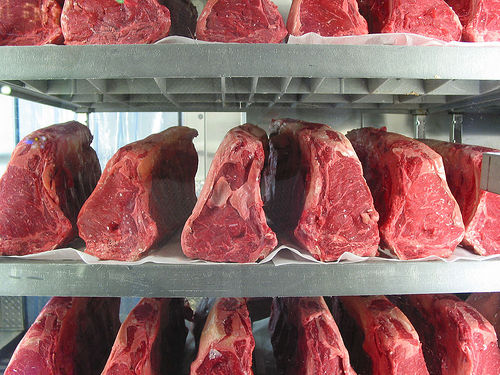It’s well-documented that girls today reach menarche earlier than previous generations. A century ago, it was common to experience one’s first period at 16 or 17; today, that’s regarded as so late that medical examinations are often conducted to reassure parents and girls that their development is normal. The typical North American girl sees her first period at age 12, give or take a few months.
Many explanations have been posited for this phenomenon; personally, I’ve long suspected that a primary cause is endocrine disruptors that are the hormones used in raising beef and dairy cattle as well as chicken in this country. Also, girls today typically achieve the minimal body fat necessary to menstruate at younger ages, due to improved health and nutrition. Now a new study suggests that it is not merely consumption of meat that lowers the age of menarche, but the high content of zinc and iron in a meat-rich diet.
Oddly, the lead researcher is quoted in the news story as saying, “These results add to the evidence that it is healthiest to avoid diets containing very high amounts of meat,” but also that there is no need for young girls to cut their meat intake. (I haven’t yet been able to locate a copy of the actual study.)



I started my period at age 11, which isn’t typical for any of the women of my family. My mother started hers at around age 14, and my younger sister was 13 when I got hers. I was always a small person, so I don’t know if consumption applied to me or not, but I’ve heard that being molested at an early age can play a role in early menstruation and early puberty in general (I was 9 when I started puberty as a whole), and I’ve unfortunately had that happen to me.
I’m not familiar with that literature regarding molestation, Lee, but that’s consistent with what I do know about the physiology of menarche and sexual maturation. So sorry to hear of your experience.
There’s some work on father-absent homes and accelerated age at menarche. I’m less familiar with work specifically on sexual abuse and trauma and age at menarche.
About hormone exposure through nutrition: I’ve often wondered why there isn’t more work on cross-border comparisions with Canada, because it’s my (not terribly well informed) understanding that Canadians have stricter limitations on hormone use in animals that end up as meat or produce dairy products. It seems like a natural experiment, because a lot about Canada is very similar to the US.